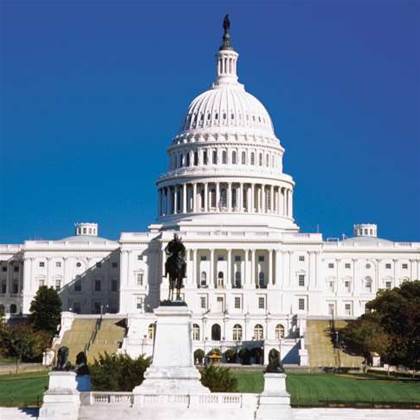
Compainies have been accused of abusing the patent system, especially in the field of IT, to file questionable patents and use them to force firms to pay licence fees.
The proposed legislation would change the way that damages are awarded, essentially reducing overall damages and limiting when punitive damages for wilful infringement can be awarded.
It also calls for more resources for the US Patent and Trademark Office to facilitate closer investigation of new applications and weed out bad patents. The vast majority of patents that are re-examined today are eventually invalidated.
"There should be no question that the US patent system produces high quality patents," said Howard Berman, a congressman and chairman of a subcommittee overseeing intellectual property, who co-sponsored the law.
"Since questions have been raised about whether this is the case, the responsibility of Congress is to take a close look at the functioning of the patent system. High patent quality is essential to continued innovation.
"Litigation abuses, especially ones committed by those which thrive on low quality patents, impede the promotion of the progress of science and the useful arts. Thus, we must act quickly to maintain the integrity of the patent system."
Previous attempts at patent reform have all failed. But the sponsors of the current bill claim that this attempt has a better chance. For starters, the bill is supported by representatives of both the Democratic and Republican parties.
Patent reform, however, is a complicated matter that affects several industries, each of which has its own priorities and wish lists. The debate essentially spans the fields of pharmaceuticals, information technology and traditional industry.
IT vendors such as IBM and Symantec welcomed the proposed legislation.
"Updating the current patent system is necessary to foster more innovation for new technology," Symantec chief executive John Thompson said in a statement.
He added that the law will "enhance patent quality, bring greater clarity to the legal and administrative review process, and expedite the approval of new patents".
However, the Biotechnology Industry Organization has raised some major concerns, claiming that the current draft threatens innovation by biotechnology firms.
The lobby group argued that biotech start-ups require strong patent protections to cover the investments of "hundreds of millions" of dollars that go into developing new medications.
The proposed changes allow a patent to be challenged throughout its term. " Under such a scheme, patents will have less value and investment predicated upon them will diminish," the group said in a statement.
The Biotechnology Industry Organisation also said that changes in the way that damages are awarded would "devalue the contribution of many biotechnology patents".
A group representing traditional industry and large pharmaceuticals, meanwhile, stressed that the proposals fail to adequately address several critical reforms and could leave patent holders without proper compensation.
The Coalition for 21st Century Patent Reform includes companies such as the General Electric industrial consortium, drug maker Eli Lilly and consumer goods manufacturer Proctor & Gamble.
"There is a need today to secure the future of innovation with reforms that will improve the examination of patent applications and address issues of cost and uncertainty in patent lawsuits," said Steven Miller, general counsel for intellectual property at Proctor & Gamble and a board member of the group.
Given the wide range of stakeholders in the debate, some opposition is to be expected. But few people doubt that a refresh of US patent law is long overdue and that the current system is hurting consumers and businesses.
The Software Freedom Law Center, an open source legal lobby group, claimed earlier this week that Windows users pay US$21.50 to cover patent cases that Microsoft has lost over the past three years.
A jury in 2003 awarded the University of California and a company called Eolas US$500m in damages.
The case revolved around a browser patent that Microsoft charged should have been invalidated and forced Microsoft to change the way that its ActiveX technology functions.
In another case, BlackBerry maker Research in Motion was forced to pay US$612m to settle a patent case that was brought by patent holding company NTP.
After RIM was found guilty of infringing on NTP's intellectual property, the firm risked having to shut down its service in North America.
The NTP patents are currently under review and could be invalidated. But that will not change the terms of the RIM settlement.

_(28).jpg&h=140&w=231&c=1&s=0)
_(33).jpg&h=140&w=231&c=1&s=0)







 iTnews Executive Retreat - Security Leaders Edition
iTnews Executive Retreat - Security Leaders Edition
 iTnews Cloud Covered Breakfast Summit
iTnews Cloud Covered Breakfast Summit
 The 2026 iAwards
The 2026 iAwards












_(1).jpg&h=140&w=231&c=1&s=0)



